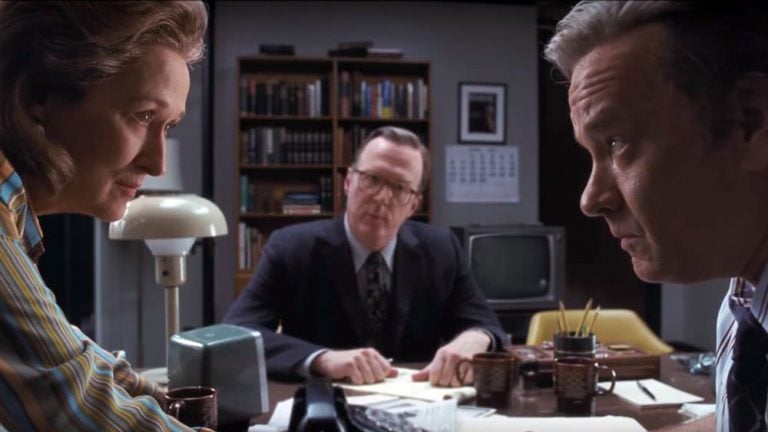At the height of his fame, Pablo Picasso’s sketches were worth a considerable sum more than the things that he sketched. He could park himself on a street corner, draw a quick picture of a nearby mansion, sell the sketch, and have enough money to buy the property several times over. He could own things by rendering them.
Steven Spielberg is in a similar position these days. Such is the director’s legendary status that if he sets out to make an old fashioned, awards-showered, and frightfully serious Best Picture contender, he can. He has the money, the prestige, and, perhaps most importantly, the perceived artistic heft to get the critical establishment falling over themselves to heap praise and nominations upon him, even though he’s spent the last few years only drawing sketches – and not particularly impressive ones at that.
And so it goes with The Post, 116 interminable minutes of Oscar catnip so stuffed with cheese it’d be better placed under a deli counter than in multiplexes. Set in the ’70s and based on efforts by those at The New York Times and The Washington Post to get the Pentagon Papers – proof that the United States government sent American soldiers to die in Vietnam knowing the war could not be won – to the public, the film spends most of its swollen running time making the repeated and strained case for its own relevancy.
Cliches are almost too numerous to detail, but let’s try anyway.
So, although the film is ostensibly about the owner of The Washington Post, Kay Graham (Meryl Streep), and the paper’s editor Ben Bradlee (Tom Hanks), what it’s really about is the freedom of the press, and, even more importantly, Donald J. Trump. Richard Nixon might be the film’s shadowy, barnstorming antagonist, but he’s only a stand-in; a cipher designed to represent the similarly paranoid, similarly putty-jowelled fascist currently pacing up and down the halls of the White House.
Yet, rather than allowing the audience to draw their own contemporary parallels, screenwriters Liz Hannah and Josh Singer stuff their script with speeches so insufferably on the nose that you half expect them to be delivered down the barrel of the camera. Nothing is subtle, nothing is communicated with nuance or class, and at times The Post more resembles a Funny Or Die version of a prestige picture than the real deal.
Cliches are almost too numerous to detail, but let’s try anyway. Whistleblowers melodramatically pause, burdened with the great weight of their task, Spielberg’s trademark lens flares popping around them. Serious men in serious suits charged with serious business stand around endlessly talking, outqupping each other like characters from an Aaron Sorkin script dumbed down by about 60 IQ points. Interns tremble at the feet of great, impossibly wise editors. And people spin on their heels and face the wall in the middle of conversations in order to stare into middle distance in a manner that no one in their life has ever – ever – actually done.
Nobody emerges from the mess unscathed. Hanks and Streep turn in the worst performances of their respective careers – the beloved and mischievous twinkle in the former’s eye has been replaced by something more akin to a look of genuine desperation, and the latter hems, haws and mutters herself into a creative corner. There’s no reason to care about either of their characters; no reason to empathise with these bourgeoisie fucks, the kind of speechmaking bores you would fake a stroke to get out of a dinner party conversation with.
And that’s not even to mention the film’s genuinely gobsmacking conclusion, a tone deaf mess that sees Spielberg suddenly shift into Marvel worldbuilding mode. He seems to be either hinting at a sequel (The Post 2: Electric Boogaloo) or desperately straining for historical relevance – either way, he grossly underestimates the intelligence of the audience he has spent two hours beating over the head with the supposed importance of his turgid film. After all, The Post might be out to criticise Trump, but like the US President, it just can’t stop letting you know what a big deal it is.
The Post is out in Australian cinemas this Thursday January 11. For more BRAG film reviews, check out our thoughts on that little independent film, Star Wars: The Last Jedi.

































